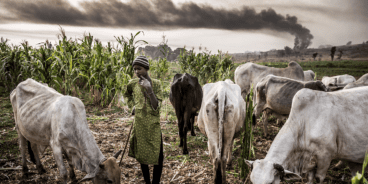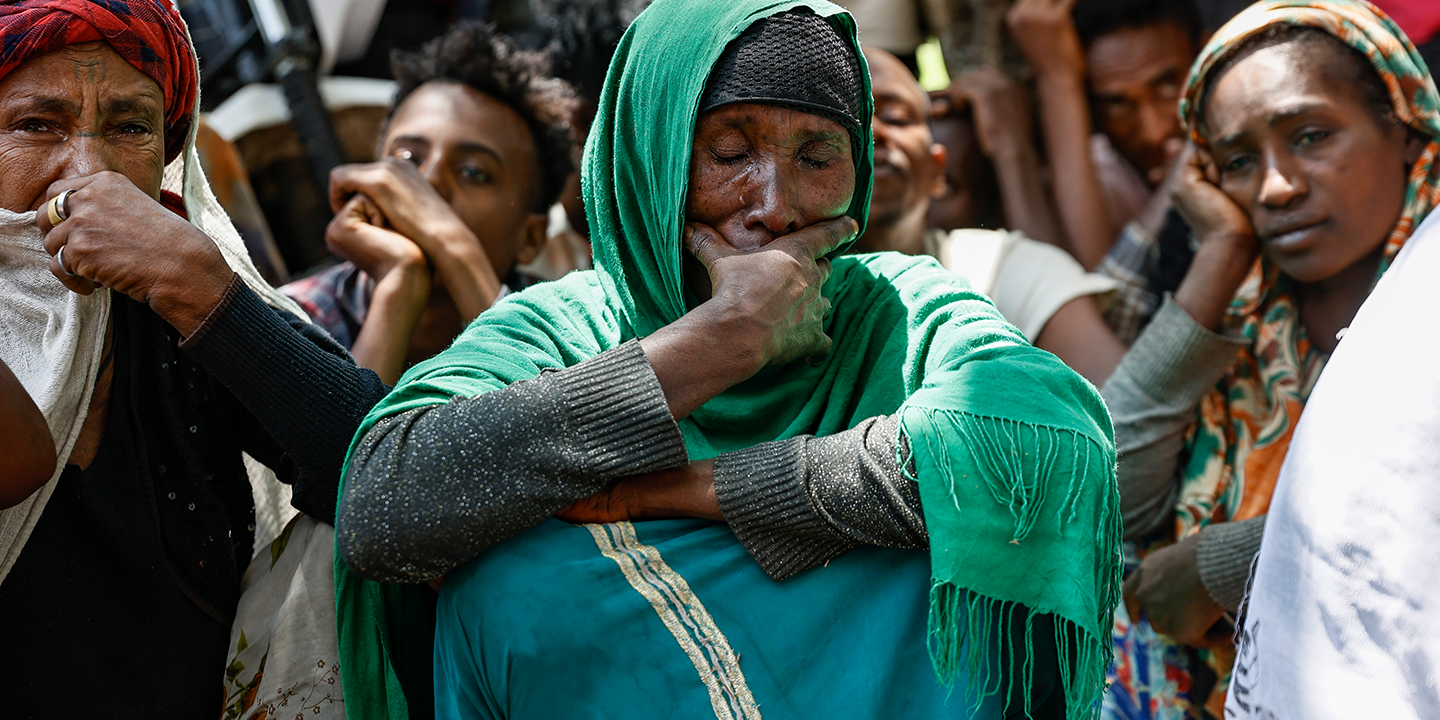

Atrocity Alert No. 359: Ethiopia, Haiti and Cameroon
Atrocity Alert is a weekly publication by the Global Centre for the Responsibility to Protect highlighting situations where populations are at risk of, or are enduring, mass atrocity crimes.
ETHIOPIAN GOVERNMENT DECLARES STATE OF EMERGENCY IN THE AMHARA REGION
On 4 August the Ethiopian government declared a six-month state of emergency in the Amhara region following months of unrest and clashes between a local informal militia, known as fano, and the national forces. Since April residents in many towns, including Lalibela, Gondar, Kobo and Debre Birhan have witnessed intermittent intense fighting as both sides fight for control of territory. Populations in the regional capital, Bahir Dar, reported heavy gunfire and military aircraft overhead in some areas. Residents in Bahir Dar have also reported that the water system has stopped working while the Director-General of the World Health Organization has said that humanitarian operations are impacted by ongoing violence in the region. The Ethiopian Human Rights Commission has reported that civilians and civilian property have been attacked in the fighting, but due to the suspension of telecommunications in many areas, the full scope of the violence remains unclear.
Tensions have been rising in the Amhara region since the federal government announced its plans to integrate regional security forces throughout the country into the police or national army. Violence and protests broke out in the region as many believed the plan would leave Amhara civilians vulnerable to attack from other armed groups. While some members of the Amhara regional forces complied with the plan, others joined the fano, which has been a predominantly Amhara youth-led militia.
Part of the Amhara distrust in the federal government and its integration plan stems from the government’s failure to adequately address long-standing grievances between communities in Ethiopia and prevent the frequent targeting of civilians along ethnic lines. Amhara civilians have been repeatedly targeted by armed groups in the neighboring Oromia region. In one incident last June, over 400 Amhara civilians were killed in Tole by the ethnic armed group, the Oromo Liberation Army.
Additionally, while Amhara forces and fano militias were allied with the federal government during the conflict in Tigray, some Amharas feel sidelined by the November 2022 cessation of hostilities agreement. Notably, although Amhara forces took control of Western Tigray during the conflict, the federal government has yet to determine the future of the area’s administration. Parts of Western Tigray – particularly Tsegede, Tselemt and Wolkait – have been disputed by Amharas and Tigrayans for decades. International human rights organizations found that Amhara militias and Eritrean forces committed ethnic cleansing against Tigrayans in the area during the 2020-2022 conflict and have reported that abuses continue despite the cessation of hostilities agreement.
The Global Centre for the Responsibility to Protect’s Ethiopia expert, Sarah Hunter said, “Deepening insecurity and rising tensions in Amhara is further evidence that genuine dialogue and conflict resolution are urgently needed. Civilians across Ethiopia need lasting peace and an end to the recurring cycles of violence.”
“UNIMAGINABLE VIOLENCE” THREATENING WOMEN AND CHILDREN IN HAITI
On 7 August the UN Children’s Fund (UNICEF) stressed that women and children are facing heightened protection risks in Haiti, where armed gangs are increasingly perpetrating kidnappings and sexual violence. The latest reports received by UNICEF show an alarming spike in kidnappings, with almost 300 cases confirmed in the first six months of 2023, nearly matching the total number documented over 2022 and close to three times more than in 2021. In most cases, children and women were reportedly forcefully taken by armed gangs and used for financial or tactical gains. UNICEF Regional Director for Latin America and the Caribbean, Gary Conille, said, “Women and children are not commodities. They are not bargaining chips. And they must never be exposed to such unimaginable violence.”
Amidst the kidnappings, women and girls are also at growing risk of sexual violence. Sexual violence often occurs in the context of kidnappings, when some women and girls are repeatedly subjected to rape over the course of several days or weeks. In July UN Secretary-General António Guterres visited Haiti, where he heard “appalling accounts of women and girls being gang-raped and of people being burned alive.” According to a report on Haiti by the Office of the UN High Commissioner for Human Rights, refusing sexual demands by armed gangs has led to reprisals, including killing and arson attacks. Armed gangs are using systematic sexual violence, including collective rape and mutilation, as a means of exerting territorial control and to terrorize and inflict pain on communities under the control of rival gangs.
Over the past two years, violence has intensified in the capital, Port-au-Prince, where armed criminal gangs are “imposing a regime of terror,” perpetrating killings, rapes, kidnappings and intimidation in a climate of widespread impunity. Amidst growing insecurity, the Haitian National Police (HNP) has lacked the capacity to stem the violence. Consequently, vigilante groups have emerged to protect their communities, which has led to a surge in vigilante killings. The UN has documented at least 264 alleged gang members killed by such groups since April. Following nearly a year of requests by the prime minister of Haiti for the deployment of an international force, on 29 July Kenya offered to deploy 1,000 police officers. The United States and Ecuador are set to introduce a resolution before the UN Security Council authorizing a new multinational force to Haiti.
National authorities, with the assistance of countries in the region, must bolster efforts to curb the flow of illicit weapons and ammunition, as these are one of the main enablers of gang violence, including sexual violence. Victims must have access to adequate medical and psychosocial care. The international community must strengthen its support to Haitian authorities, including by bolstering the capacity of the HNP with a robust multinational force.
ESCALATION OF ATTACKS BY BOKO HARAM IN THE FAR NORTH REGION OF CAMEROON
On 3 August at least 12 people were killed by the armed extremist group Boko Haram in Darak, a small fishing village in the Far North region of Cameroon. According to local communities, at least three villages on the island have been attacked in recent weeks. The latest attack is part of a broader pattern of increased Boko Haram violence against civilians that started earlier this year. Following a series of attacks by alleged Boko Haram fighters in March, more than 4,000 people were displaced in several localities in the Mayo-Tsanaga district. The following month Boko Haram fighters reportedly attacked and destroyed approximately 400 shops and houses in the Mayo-Moskota district.
For over a decade recurrent violence perpetrated by Boko Haram has resulted in mass atrocities in the Lake Chad Basin, on the borders of Nigeria, Chad, Niger and Cameroon. The Boko Haram insurgency began in Nigeria in 2009 and was aimed at overthrowing the secular government and establishing an Islamic state. Across northern Nigeria the group has perpetrated widespread killings, suicide bombings, abductions, torture, rape, forced marriages and the recruitment of child soldiers, as well as attacks that are directed against government infrastructure, traditional and religious leaders and the civilian population. Boko Haram has subsequently spread into Chad, Niger and Cameroon, where it perpetrates similar abuses.
When Boko Haram expanded from Nigeria into Cameroon in 2014, the group disrupted traditional socio-economic relations between communities in the Far North region and weakened local trading networks, leading to an increase in inter-communal violence. The volatile security situation has been further exacerbated by growing desertification, water scarcity and limited access to grazing land, which has fueled clashes and tensions between communities.
The government of Cameroon has increased its troop deployment to the Far North region over the past few months. During an emergency meeting in May, the Cameroonian government also requested more troops from Nigeria and Chad to be deployed to their shared borders as part of the regional Multinational Joint Task Force, which was established in 2015 to combat armed extremism.
While combating Boko Haram, Cameroon’s security forces must carry out all military operations in strict compliance with international humanitarian and human rights law. Juliette Paauwe, Cameroon expert at the Global Centre for the Responsibility to Protect, said, “The violence stoked by Boko Haram is not just a security issue. Meaningful programs that tackle poverty, radicalization, corruption and environmental degradation are urgently needed if the government of Cameroon wants to address the root causes of inter-communal violence and armed extremism.”
Related Content


11th Meeting of the Global Network of R2P Focal Points Outcome Document
